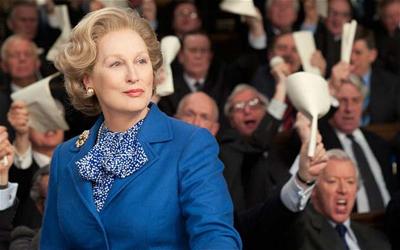Congrats, Meryl, your latest promotional campaign is working wonders. There’s a segment on 60 Minutes, the cover of Newsweek and loads of other articles, all fawning over your portrayal of contentious former British prime minister Margaret Thatcher. It is, beyond any reasonable doubt, an impressive performance. As Thatcher, you’re the ultimate drag king – portraying the woman dubbed The Iron Lady for her anti-Soviet rhetoric – as steely, but ultimately human.
Thatcher has a reputation as a tough old boot, gaining notoriety early in her political career for cutting milk-money funding for schoolchildren. In this film, though, she is projected through the lens of dementia, a condition that has afflicted her in recent years. Streep’s Thatcher can’t handle a trip to the corner store. She keeps talking to her husband, who has been dead for almost a decade. She thinks she is still prime minister.
In fact, the film spends too much time showing us how Lady Thatcher has lost her marbles. We know the story five minutes in, so what’s the point? It’s as though director Phyllida Lloyd was so scared of the many controversies surrounding Thatcher, she felt it best to avoid the historical record almost altogether, hammering away instead on Thatcher’s fading faculties.
We do see a few fleeting glimpses of notable moments from Thatcher’s time in office. We see angry and violent union protesters surround her car as she attempts to leave Parliament. We see the IRA hotel bomb attack that killed two of her MPs and almost Thatcher herself. But there’s scant political context or detail, a choice that will leave those audience members too young to remember the ’80s thinking Thatcher was little more than feisty.
In reality, like her US contemporary Ronald Reagan, Thatcher embodied a broad range of contradictions. She was a grocer’s daughter who faced prejudice because of her working-class background, but who, as prime minister, declared class a non-issue in Britain. She was a glass-ceiling-smashing woman who rejected feminism. And she certainly faced flack for that: on the hilarious British satirical comedy TV show Spitting Image, she was depicted as a suited man who stood at a urinal to relieve herself.
With the release of The Iron Lady those on the left have reiterated the charges that Thatcher was dangerously out of touch, that her Friedmanite economic policies paved the way for rampant corruption in Britain’s banking system, and that she defended murderous dictators like Chile’s Augusto Pinochet. Thatcher did her level best to attack labour in the UK, a policy approach that set the economic rights of workers back by decades. (It must be noted, though, that some on the left argued that the unions were out of control in the late ’70s and needed to be placed in check.)
Thatcher also supported “constructive engagement” with South Africa, opposing the boycotts that ultimately proved effective in forcing an end to apartheid. And in 1988, Thatcher proved she wasn’t entirely above pandering to homophobes. It was her government that passed Clause 28 of the Local Government Act, a vague bit of legislation that forbade municipalities from the “promoting of homosexuality” in any way, including “the teaching in any maintained school of the acceptability of homosexuality as a pretended family relationship.” That law was never actually enforced and was repealed in subsequent years, but it sent a chilling message to Britain’s queer citizens: its government was hostile to them, at best.
Still, rightwing types are praising The Iron Lady as a monument to Thatcher. Conrad Black calls the film a vindication. His piece was published in National Post, perhaps ironically, while Black sat in a Florida prison cell.
As a work of cinema, it’s Streep who makes The Iron Lady most watchable. She emerges as sheer perfection. This is an acting exercise in emulation — every tick, every nod, every raising of the eyebrow, not to mention the accent — Streep has done her extensive homework, and it shows. It’s an undeniably stellar performance.
It’s just too bad about the rest of the movie.

 Why you can trust Xtra
Why you can trust Xtra


